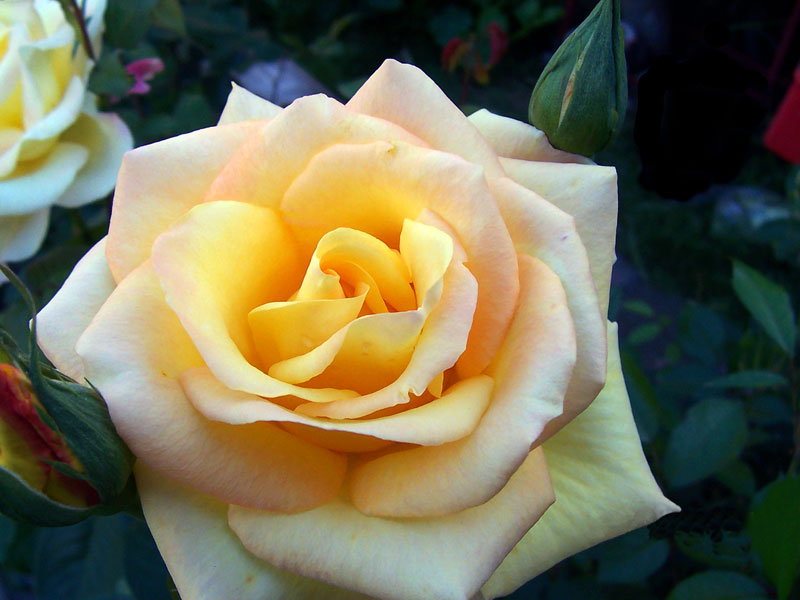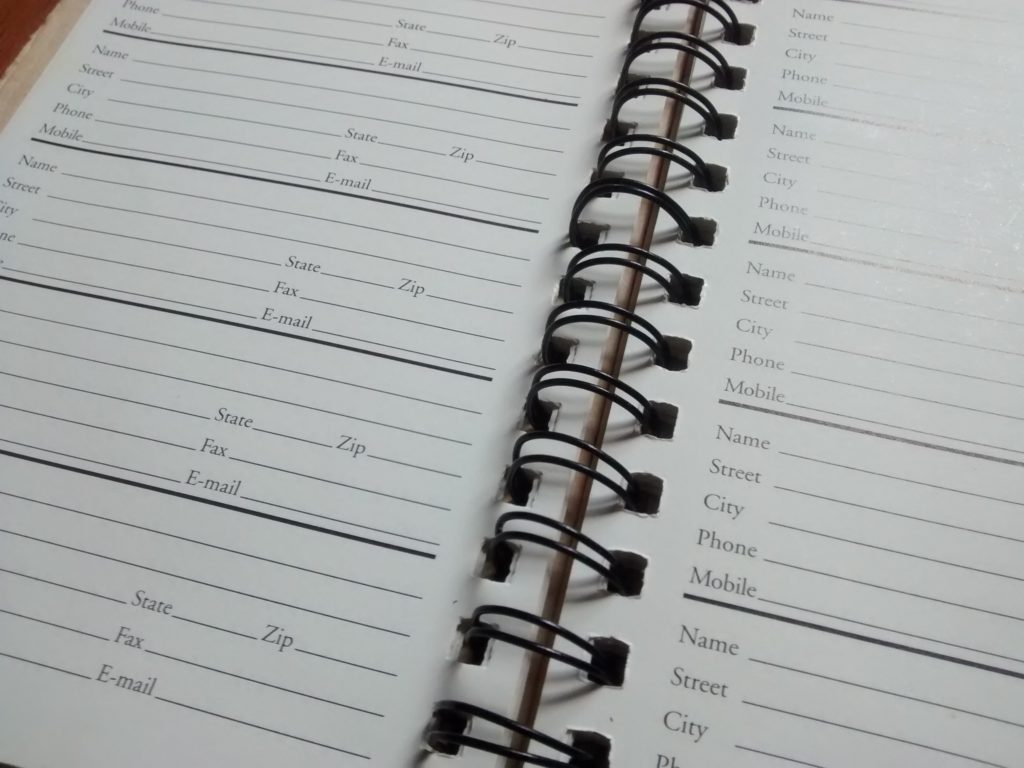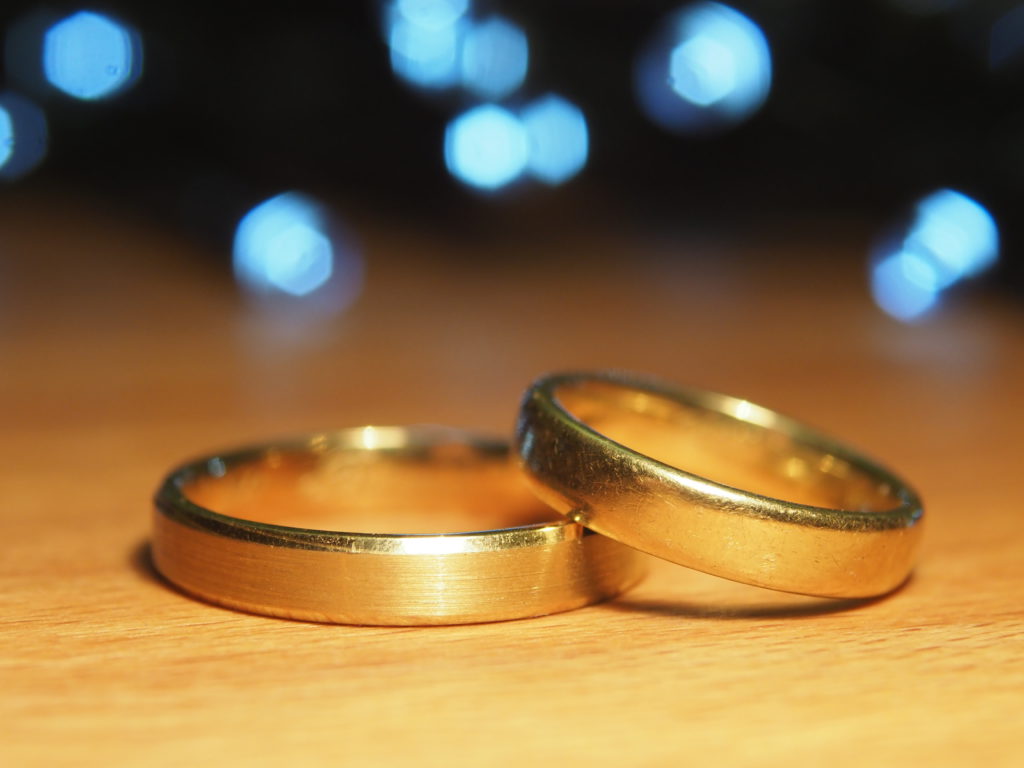What’s in a name?


Lying on my desk is an item that is completely out of pace with the modern digital age – my address book. It is the same one I have had since I was a teenager. The spine is broken and the paper has come off the front cover, showing the thick cardboard underneath. Written on the inside of the front cover is my address and phone number from more than twenty years ago and, cryptically, ‘White tshirt’ (clearly important, as it was underlined three times). On the inside of the back cover is a post-it with the email address of a university flatmate, and a doodle of the 80’s Comic Relief logo, a favourite of mine to sketch when bored.
Leafing through, I see addresses of grandparents, aunts, friends from high school, from university, from work. Addresses in the UK, Holland, Germany, Finland, China, Malaysia. Some people I barely remember, others have remained my friends through the decades, their entries extending to many pages as addresses were crossed out and new ones written below. Between the pages is a loose leaf containing an address I know I will never need, but I keep it as it is written in my mother’s elegant handwriting, so precious now she is gone. The address book is a microcosm of the relationships through many years of my life.
Looking closer, something unusual appears. The address book is not organized by surnames, but by first names. This started, quite simply, because at the age when I got the book surnames were of little importance to me. As I got further into my teenage years, I was proud of my system, reasoning that when my friends got married, I wouldn’t need to create a new entry for them. Years later, marriages – and divorces – have proved the practicality of this method.

While happy each time a friend married – fortunately they all chose good partners, even if the relationships sometimes didn’t stand the test of time – I always felt a stab of sadness when their names changed. Jenkins, Carter, Barker disappeared, to be replaced by Jones, Hollander, Belham. Every time I wrote the new names on an envelope, it felt as though part of a childhood friend had disappeared. It was a feeling that was particularly strong when my sister married, her name change seeming to take her away from us and into a new family.
It took me back to my childhood when I first discovered that my mother’s surname would die out. She had two sisters and one brother. All three girls married and took their husband’s name, which was passed on to their children. The brother, while caring for his stepchildren, never had children of his own to carry on the name. The sense of loss was strengthened when I discovered that the surname was unique to our branch of the family, having been created after Finnish independence, to replace the previous Swedish surname. A conscious expression of roots and cultural identity, with the added quality of both sounding beautiful and having a meaning that evoked Finnish nature – ‘land of the pine trees’.
I still have my own name, and will retain it even when I marry. I can’t imagine calling myself anything else. I always loved writing out my initials on anything I owned, and was delighted if I was given a present with them on. I am annoyed when people misspell my name out of willful laziness (it’s in my email address, for goodness sake!). If the name’s not right, then it’s not me.

For a married couple, the name issue can be quite simply settled by each keeping their own name. It becomes more complicated when children come along. We had to make a choice. In the Netherlands, the choice for the first child automatically goes for the second child too. In enforcing this, the authorities recognize the power of names, that having the same surname helps children to feel that they are part of the same family. But it also means that there is no possibility of sharing out the children- the first one gets your surname, the second one gets mine – it’s one or the other. My partner and I had an immediate stand-off – we each wanted our child to have our own surname. How can you then decide? Neither surname was at risk of dying out, which might have otherwise tipped the balance. Nor were there any differences of ease of spelling or pronunciation, both our surnames requiring several repetitions and spelling out in either country. Even on the basis of attractiveness, they were pretty much equal. Finally, my partner found an edge – he was concerned that schools and other such institutions would be more likely to doubt him being the father than me being the mother, if the surnames were different. Reluctantly, I agreed. If I had only known back then that, at school, we would mostly be referred to as ‘the mother of –’ and ‘the father of – ’.

That was the surname sorted out. Then came an even tougher question – the first name. We spent evenings with the Prisma dictionary of children’s names, putting a mark against the names we liked. The lists were long, but the overlap between our two lists fortunately consisted of a manageable number of choices. But, whereas other parents chose the name before the birth, we stopped at that shortlist. For both of us, it was inconceivable to name a child we had never seen. What if the name didn’t suit them?
Both of our daughters spent their first night nameless, to the utter bewilderment of all the medical personnel around us. For our first daughter, we went through our shortlist and one name jumped out (fortunately the same name for both of us). Our younger daughter, on the first morning of her life, was visited by Sinterklaas. He gently admonished us to be sure she had a name by the next year, to be entered in his book. When we got home, we pulled out our shortlist again. No, no, no. None of the names suited her. What could we do? We went back to our original lists, and had the good luck to find the perfect name, our preferences having shifted over time.
Of course, the story doesn’t end there. For us, our girls could never possibly have a different name. For them, their names are already malleable – despite having short names, they shorten them even further, referring to each other with single syllables. One day in the future, they may marry and choose to take their spouse’s name. Or they may change it for another reason. Our choices of their names were a first step in identification, they will take the search for their identity further, throughout the rest of their lives.

‘A rose by any other name would smell as sweet’, said Shakespeare. So, why do names matter so much? I think the answer is the same as for everything else that we can use to express our identity – they matter because we make them matter. My friend’s surnames mattered to me because I associated the name change with the inevitable change in our relationship as they occupied themselves with their new partners and families. My daughter’s surnames – and my mother’s – were important because, living surrounded by a different culture, I feared losing my roots, or being excluded. Finally, the care I took in the choice of my daughter’s names was a symbol for my love for them. It’s not all in my head – it’s all in my heart.